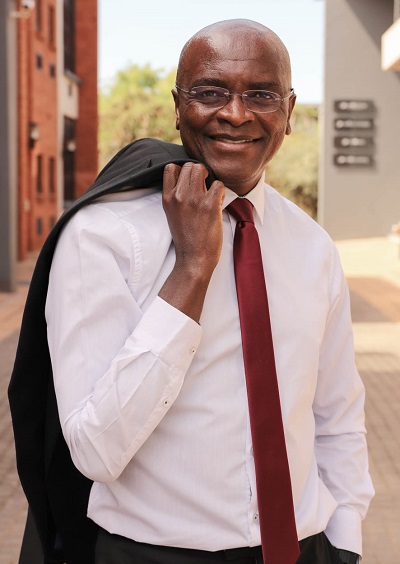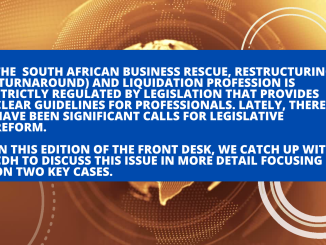

Partner: GCS
Looking back, it is hard to fathom that the world was in a period of significant economic growth before the onset of the Covid-19 Pandemic. During this period, three of the world’s fastest growing economies were African countries economies. This was a golden period of growth and corporate recovery
Unfortunately, Africa has been hardest hit by the Pandemic. It is a well-established fact that SMMEs are important economic drivers. These companies are particularly important in Africa where these companies support a community.
As we plan our recovery from the Pandemic, it is important to note that Africa can rise from the ashes and be a prosperous economies. Africa is becoming increasingly digitised. As a report by the World Economic Forum points out, it is this digitisation that can play an important role in corporate recovery.
Bridging the digital divide
The report points out that broad-based digitisation, especially for those people at the bottom of the pyramid, is an effective measure to ignite and sustain economic growth, and it starts with ensuring access to digital infrastructure for all. A study by the International Telecommunications Union (ITU) found that expanding mobile broadband penetration by just 10% in Africa would equate to an increase of 2.5% in GDP per capita.
Yet, traditional models for investing in digital infrastructure do not stack up in many rural or remote areas, due to a combination of high deployment costs, regulatory barriers and poor returns on capital. The international community must immediately unlock development financing to spend on new models of digital infrastructure investment, including financing partnerships between mobile operators and government to build shared infrastructure. Taking big bets on experimental technologies and innovations is also key. A good example is our partnership with Google on Project Loon in Mozambique, which aims to provide 4G coverage across a 100 000 km2 area through a low-orbit balloon network. In parallel, we are exploring various alternative models in Africa, including OpenRAN and satellite, with the same objective.
Can this enable corporate recovery?
Invest in digital inclusion and skills
The report adds that nearly half a billion people in Africa have mobile broadband coverage, but do not access it. This clearly points to more complex barriers to digital inclusion than simply network coverage. In a 2019 study, the United Nations Conference on Trade and Development (UNCTAD) found that low digital skills and demand were the biggest barriers to digital entrepreneurship in developing countries.
Investment must be channelled into broad-based skills development in order for all citizens to get the most out of connectivity and develop an African digital ecosystem of local digital content and services. This begins with governments integrating digital skills into national curricula for students, but should be extended out with businesses and community organisations providing life-long learning on digital topics. This will create informed demand for digital solutions that generate social and economic benefits in tune with specific local needs. The Africa Union’s Digital Transformation Strategy provides an excellent proposal through their Massive Online Digital Skills for All programme.
This is a low hanging fruit when it comes to corporate recovery.

Photo By: Canva
Digitise public services, at scale
The WEF report points out that while many governments across Africa have driven innovation in digital public services, there are few examples that deliver at scale. The Covid-19 crisis has accelerated initiatives around e-health and e-education. In the past two months, the use of our e-learning platforms has surged across Africa, often many backed by governments working with telecom companies to zero-rate online education resources.
Public-private partnerships should now be established to scale these efforts, with the support of international development finance. Providing the entire public with high-quality digital health and education services would lock in the digital society for good.
While expensive and regarded as an unnecessary investment by many companies, this drive corporate recovery efforts.
Close the digital gap for small and medium enterprises
The report points out that those small and medium enterprises that have been able to ‘digitally diversify’ have proven themselves to be more resilient during the Covid-19 crisis. Those that did not now have to play catch-up in the midst of an economic crisis. To support these businesses, we must leverage existing and create new technology offerings tailored towards micro-, small and medium sized enterprises in Africa, rolled out with the support of government. A good example is mobile money, where many African countries already have made significant headway. Mobile money fulfils the twin objective of supporting (financial) inclusion for the unbanked, while underpinning the growth of a new ecosystem of e-commerce, payments and financial solution for entrepreneurs. MIT research also showed that access to the M-Pesa mobile money platform lifted 2% of households out of poverty in Kenya.
Finally, for all of these actions, we must ensure that acceleration of digital does not cement or exacerbate existing inequalities. There is already a 34% gender gap in digital access in sub-Saharan Africa. A growing body of evidence highlights that women’s livelihoods will be disproportionately impacted by the crisis, including the risk that many girls are pulled out of education for good during or after lockdowns. If we do not proactively address these inequalities, digital growth across Africa will remain skewed along gender lines.
The time for a digital Africa
The report adds that, collectively and through true multi-stakeholder partnerships, we must all rally around African digitisation as one of the key development challenges of the decade. Ensuring broad-based, inclusive and sustainable digitisation has become one of the most urgent developmental issue of our generation.
Whilst the global economic outlook is dire, Covid-19 has shown us that we have a unique opportunity to rapidly harness digital technology to build more prosperous and equitable societies for all. It is an opportunity we must take together, now to ensure that we lead the corporate recovery charge as we did before the Pandemic.

Photo By: Canva
The role of the turnaround professionals
When faced with financial distress, companies will be tempted to return to basics and focus on the core strengths that made them profitable in the past.
However, the old paradigm has been disrupted and multi-generational companies simply cannot return to their old ways because the world we live in today is so vastly different from the world we lived in two years ago, let alone five years ago.
Turnaround professionals need to encourage companies to be forward looking and focus on how current actions need to be different from past actions. I have mentioned in previous thought leadership articles that the Covid Pandemic as an accelerant of the 4IR; however, the 4IR would have disrupted the paradigm even without Covid. The only difference is that change would have been a lot slower.
What could have been a five year transition into digital technology became a two year transition. This pace of change will only increase and it is important for companies to show their investors that they are geared towards digital technology. It is the direction that the world is moving towards.
Africa cannot be low adopters of digitisation. The only way to recover from the Pandemic is to build profitable, agile companies that are digitally enabled. The ability to adapt and proactively respond to any crisis are attributes that creditors and funders look for in a company that needs to fund a business rescue/recovery effort.
We need to focus on corporate recovery. The WEF reports that future economic growth needs to be built off the back of well run, financially strong institutions. The turnaround profession has the skills and expertise to enable this. We cannot falter now.
Moses Singo is a Partner at Genesis Corporate Solutions and is a Junior Business Rescue Practitioner.




